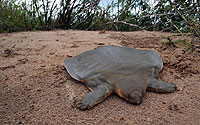Rare softshell turtle rediscovered in Cambodia
Rare softshell turtle rediscovered in Cambodia
mongabay.com
May 16, 2007
Scientists from Conservation International have successfully hatched a clutch of eggs from one of the world’s most endangered turtle species.
The mother, an 11-kilogram (24.2-pound) female Cantor’s giant softshell turtle (Pelochelys cantorii), was captured and released during a survey in March by researchers from Conservation International (CI), World Wildlife Fund (WWF), the Cambodian Fisheries Administration, and the Cambodian Turtle Conservation Team.
“This incredible discovery means that a unique turtle can be saved from disappearing from our planet,” said David Emmett, a CI wildlife biologist. “We thought it might be almost gone, but found it in abundance in this one pristine stretch of the Mekong, making the area the world’s most important site for saving this particular species.”

© CI-Cambodia/David Emmett |
CI said that unlike other turtles that have a hard shell, Cantor’s giant softshell turtle “has a rubbery skin with ribs fused together to form a protective layer over the internal organs. To protect itself from predators, the turtle spends 95 percent of its life hidden in sand or mud with only its eyes and nose showing. It possesses long claws and can extend its neck with lightning speed to bite with jaws powerful enough to crush bone.”
The species, which can grow up to 2 meters (6 feet) in length and weigh more than 50 kilograms (110 pounds), was last seen in Cambodia in 2003. Cantor’s giant softshell turtle is listed as Endangered on the IUCN Red List of Threatened Species due to hunting and habitat destruction from dams, irrigation, and river dredging.
CI said that the stretch of the Mekong where the turtle was found was closed for many years to scientists due to the presence of Khmer Rouge fighters.
“Our survey work to date has documented some of the highest freshwater biodiversity values in the entire Lower Mekong Basin,” said Mark Bezuijen of WWF’s Living Mekong Program, who led the team. “We discovered an entirely new plant species, Amorphophallus sp., along with surviving populations of such threatened species as terns, fish eagles, green peafowl, otters, and silvered leaf-monkeys. More than 180 fish species were recorded, including a new record for Cambodia.”
This article is based on a news release from CI